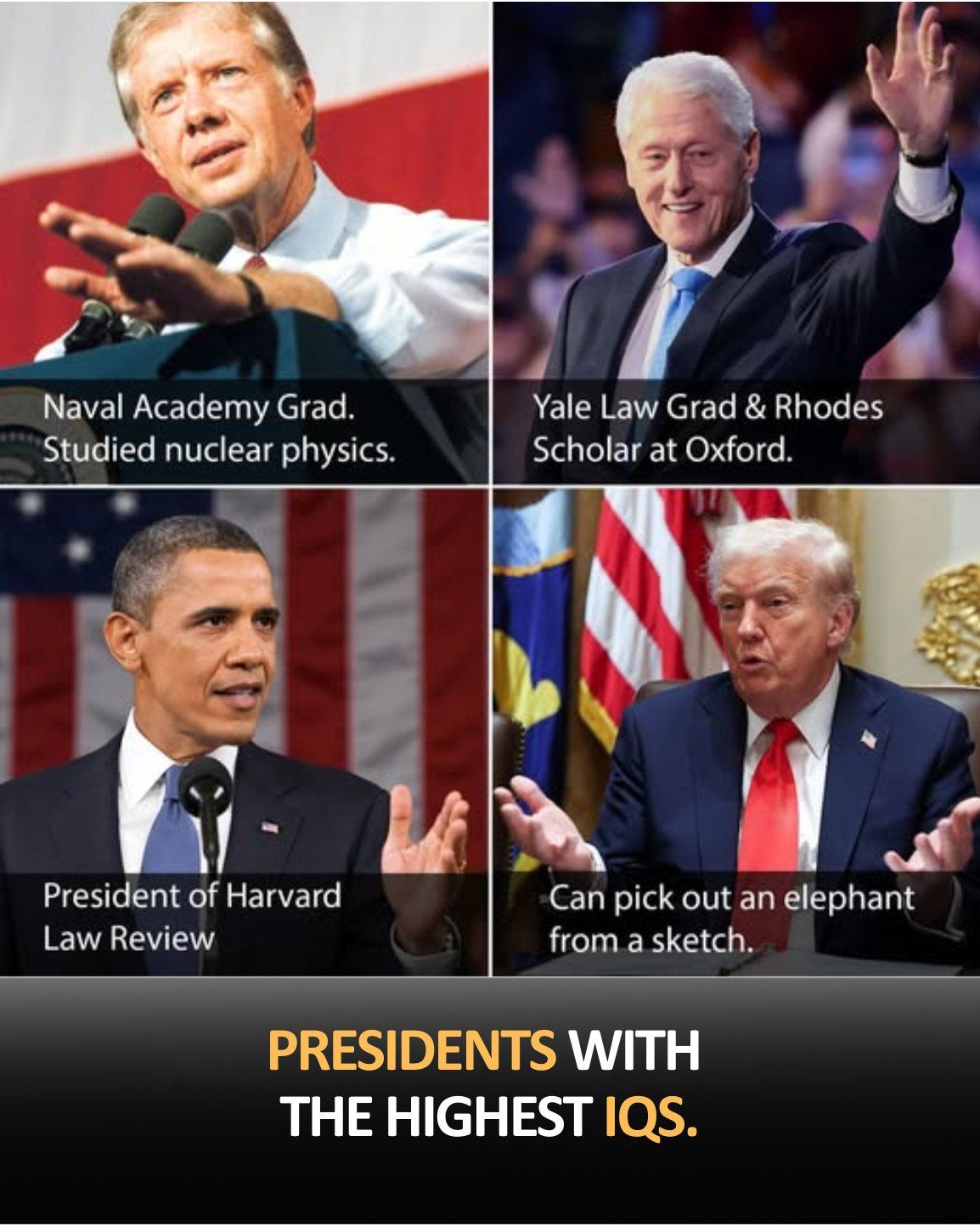🧠🇺🇸 Intelligence vs Leadership: What Makes a President Truly Great?

A viral image is making waves online, sparking conversations across social media, classrooms, and political circles alike. It features four former U.S. presidents — Jimmy Carter, Bill Clinton, Barack Obama, and Donald Trump — accompanied by captions highlighting their education and intelligence:
Jimmy Carter: Studied nuclear physics at the Naval Academy ⚓💡
Bill Clinton: Yale Law graduate and Rhodes Scholar at Oxford 🎓🌍
Barack Obama: Became President of the Harvard Law Review 🏛️✒️
Donald Trump: Captioned humorously as “Can pick out an elephant from a sketch” 🐘😂
At first glance, the meme seems playful — even satirical — but it also raises a fundamental question: what truly makes a president great? Intelligence: A Valuable Tool, But Not a Guarantee
Intelligence: A Valuable Tool, But Not a Guarantee
There is no doubt that intelligence matters in leadership. Strategic thinking, problem-solving, policy analysis, and decision-making all benefit from a sharp mind. Carter’s background in nuclear physics, Clinton’s Rhodes Scholarship, and Obama’s leadership at Harvard Law Review demonstrate extraordinary intellect. Yet historians caution that IQ rankings of presidents are largely speculative, and intelligence alone does not dictate success in the Oval Office ✅❌.
In fact, some of the most effective leaders throughout history were not necessarily the most academically accomplished but excelled in emotional intelligence, vision, and resilience. Emotional intelligence — the ability to understand, empathize, and communicate — is often the differentiator between a good president and a truly transformative one 💛🤝.
The Carter Case: Dedication and Moral Leadership Jimmy Carter, a Naval Academy graduate with a background in nuclear physics, is widely respected for his intellect, discipline, and dedication. Yet his presidency faced enormous challenges, from the Iran hostage crisis to economic struggles. Carter’s intelligence allowed him to navigate complex situations, but his moral compass, humility, and empathy defined his enduring legacy. Even decades later, he is celebrated more for his humanitarian work and advocacy for peace than for policy alone 🌍🕊️.
Jimmy Carter, a Naval Academy graduate with a background in nuclear physics, is widely respected for his intellect, discipline, and dedication. Yet his presidency faced enormous challenges, from the Iran hostage crisis to economic struggles. Carter’s intelligence allowed him to navigate complex situations, but his moral compass, humility, and empathy defined his enduring legacy. Even decades later, he is celebrated more for his humanitarian work and advocacy for peace than for policy alone 🌍🕊️.
Bill Clinton: Charisma Meets Brilliance
Bill Clinton combined extraordinary intellect — Yale Law, Rhodes Scholar at Oxford — with charisma and emotional intelligence. His ability to connect with people, articulate vision, and navigate political complexities allowed him to achieve significant legislative and diplomatic successes. Yet, Clinton’s presidency also reminds us that intelligence without personal discipline or ethical grounding can lead to missteps with long-lasting consequences. Barack Obama: Strategic Vision and Inspirational Leadership
Barack Obama: Strategic Vision and Inspirational Leadership
Barack Obama’s leadership at the Harvard Law Review foreshadowed his unique combination of analytical brilliance and emotional resonance. As president, Obama demonstrated an ability to balance data-driven policy decisions with the power of storytelling, empathy, and inspiration. His hallmark wasn’t just what he knew, but how he applied knowledge to unify, inspire, and lead with purpose ✨👂🗣️💪. Obama illustrates the principle that intelligence is most potent when paired with vision, communication, and integrity.
Donald Trump: A Different Measure of Leadership
Donald Trump’s caption in the meme — “Can pick out an elephant from a sketch” — may elicit laughter, but it subtly underscores an important truth: traditional measures of intelligence do not fully define leadership. Trump’s appeal stemmed less from formal education and more from his ability to communicate with a broad base, leverage media, and harness public sentiment. While his presidency was controversial and polarizing, it demonstrates that leadership can manifest in unconventional ways, and that emotional resonance, confidence, and decisiveness can outweigh academic accolades for certain constituencies. Leadership ≠ IQ
Leadership ≠ IQ
The overarching lesson from this meme is simple yet profound: intelligence alone does not make a great president. Leadership demands a delicate balance of:
-
Analytical thinking — to understand complex policies and global issues
-
Emotional intelligence — to connect with citizens and inspire confidence
-
Decision-making under pressure — to act decisively in crises
-
Humility and empathy — to serve the people above self-interest
A brilliant mind without compassion or humility can still make catastrophic choices. Conversely, a leader with average IQ but extraordinary empathy, communication skills, and moral vision can leave a lasting, positive impact.
What This Means for the Future
This meme reminds us that the most effective leaders listen before acting, learn continuously, and prioritize service over ego. It challenges society to rethink how we evaluate leaders: not by test scores or degrees alone, but by the quality of their judgment, character, and ability to mobilize positive change.
Leadership and intelligence can coexist, but true greatness comes from using knowledge to serve others, uplift communities, and inspire hope 💡❤️. The presidency — and leadership in general — is less about being the smartest person in the room, and more about being the person who can harness wisdom, empathy, and vision to guide a nation through its most challenging moments 🌍🕊️.
So the next time you see a meme comparing IQ or degrees, remember: the mark of a great leader is not what they know, but what they do with what they know. And in that measure, history often surprises us, favoring those who combine intelligence with courage, compassion, and vision ✨💪.











